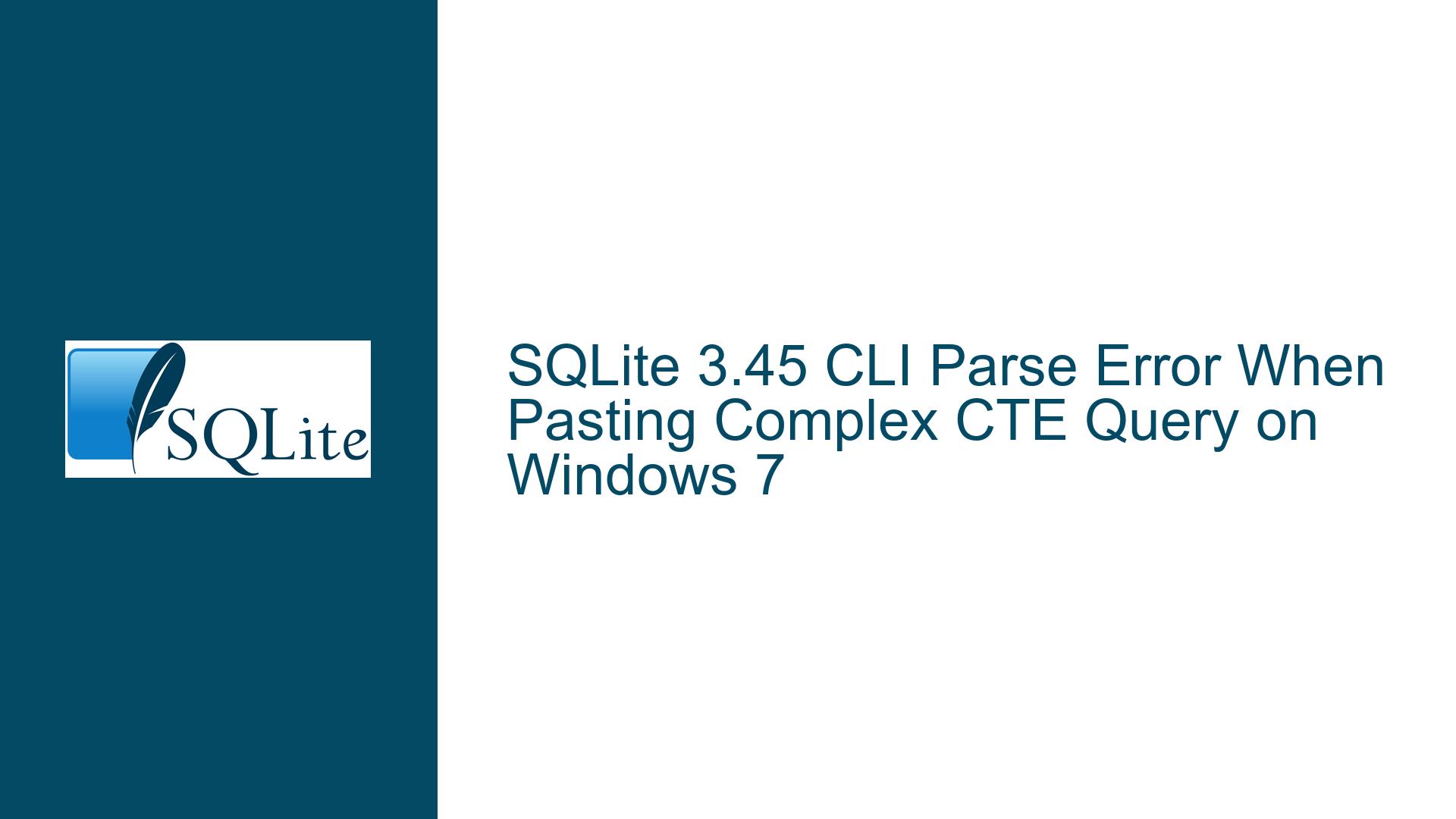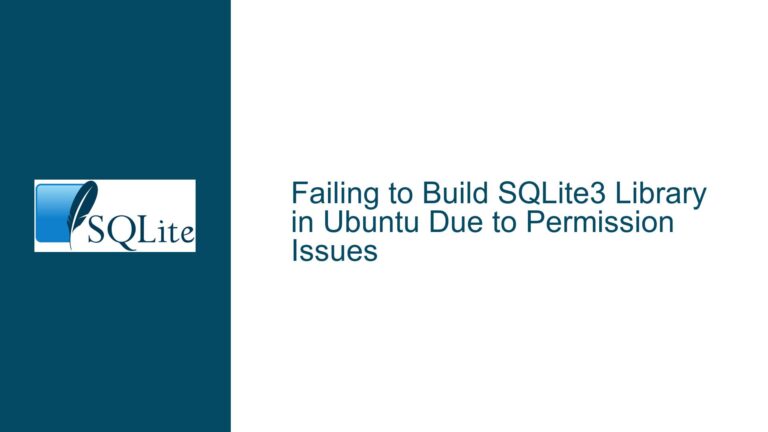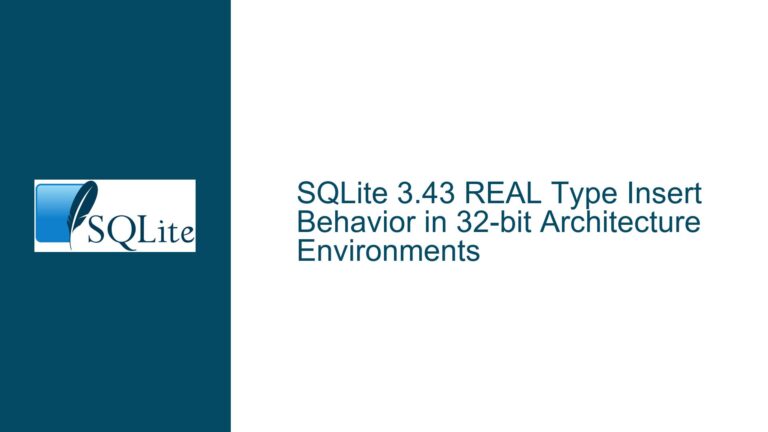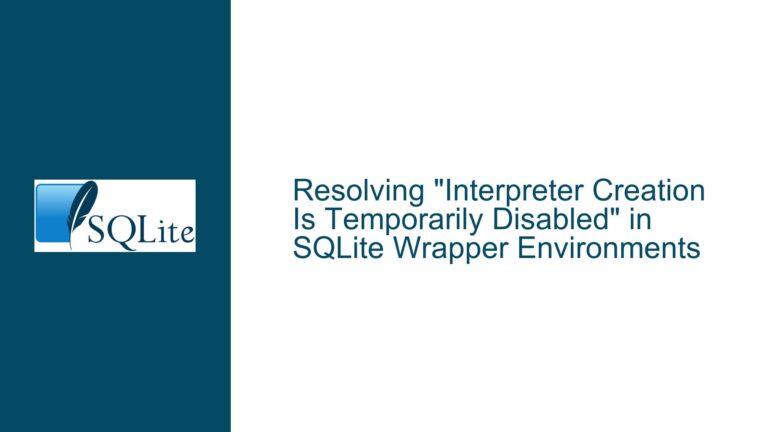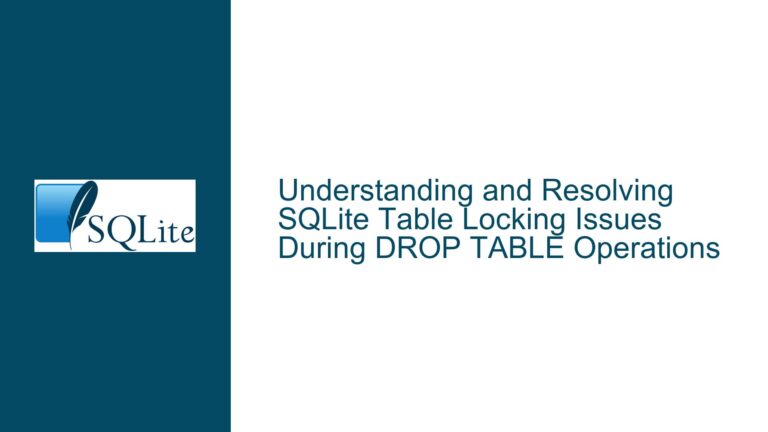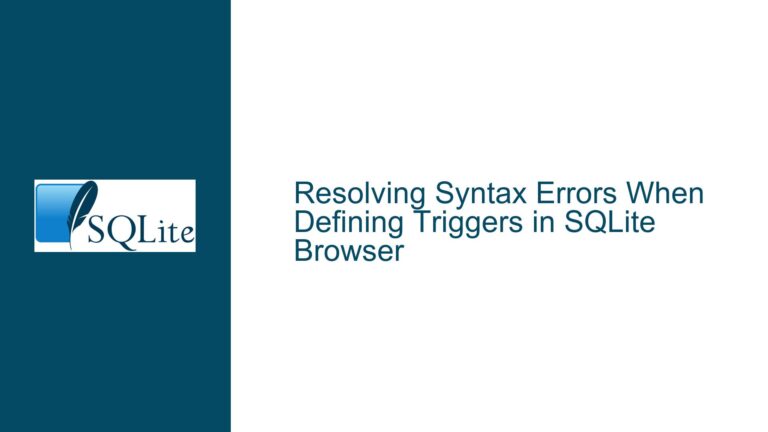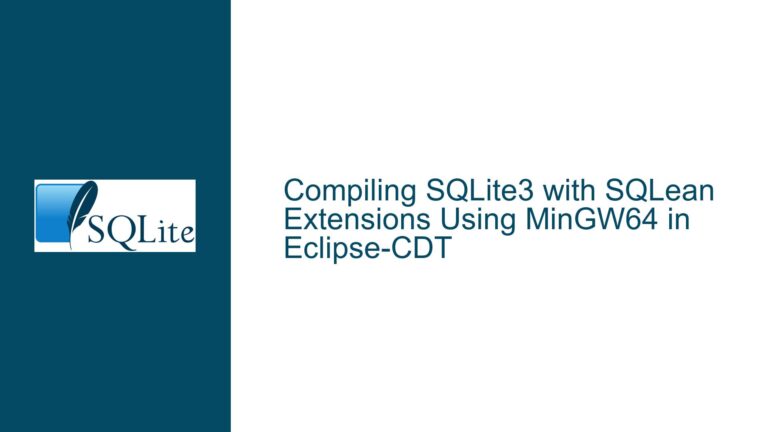SQLite 3.45 CLI Parse Error When Pasting Complex CTE Query on Windows 7
Character Encoding Conflicts in Windows 7 CLI Input Handling
Issue Overview: Syntax Error Triggered by Pasted Query in SQLite 3.45 CLI
The core problem involves a Parse error: near ".": syntax error when executing a complex Common Table Expression (CTE) query with materialized subqueries via direct pasting into the SQLite 3.45 Command-Line Interface (CLI) on Windows 7. The identical query executes successfully when read from a file using .read, works in SQLite 3.43, and runs without error on modern Windows versions. The error arises specifically at the clause b.i < c.i during manual input but vanishes when the query is loaded from disk. This discrepancy points to an interaction between the SQLite CLI’s input processing logic and legacy Windows console behavior when handling multi-line pasted text containing UTF-8 or control characters.
The query structure involves three materialized CTEs (t, t3, t45) generating numerical sequences and joining them with arithmetic conditions. The error message’s truncated output (sqlite345.exeelect ...) suggests buffer corruption or input misinterpretation during parsing. Critical observations include:
- The error does not occur when using
.readwith the same query text. - The failure is version-specific: SQLite 3.43 works; 3.45 fails.
- The issue is OS-dependent: Windows 7 exhibits the problem; modern Windows versions do not.
- The error location is misleading: The parser flags
b.ias erroneous despite syntactically valid code.
This behavior stems from changes in SQLite 3.45’s console input handling for UTF-8 compatibility, which inadvertently exposed latent bugs in Windows 7’s console subsystem. The CLI now defaults to UTF-8 for I/O on Windows 10/11 but interacts poorly with legacy Windows 7 console buffers, leading to character encoding mismatches or buffer overflow during multi-line pasting.
Possible Causes: UTF-8 Console Handling and Buffer Corruption
Three primary factors contribute to this failure:
1. UTF-8 Input Processing Incompatibility with Windows 7
SQLite 3.45 introduced enhanced UTF-8 support for console I/O on Windows, aligning with modern UTF-16-native terminals. However, Windows 7’s console lacks robust UTF-8 handling, converting pasted text into legacy code pages (e.g., CP-1252) or misinterpreting line feed/carriage return (LF/CR) sequences. When pasting multi-line queries, hidden control characters or encoding mismatches may inject invalid bytes into the input buffer, confusing the SQL parser.
2. CLI Input Buffer Truncation During Pasting
The Windows 7 console has a 254-character input buffer limit per line in some configurations. Complex CTE queries with lengthy lines (e.g., t AS Materialized(...)) may exceed this threshold when pasted, causing line breaks to be inserted mid-token or keywords to split across buffers. The SQLite 3.45 CLI’s readline implementation, optimized for UTF-8, may fail to reassemble split tokens correctly, leading to syntax errors.
3. Materialized CTE Parsing Edge Cases
Materialized CTEs (AS Materialized) require temporary table creation, which alters the query planner’s token consumption pattern. The combination of materialization hints and nested subqueries increases parser state complexity. If input buffering issues corrupt the Materialized keyword or adjacent tokens, the parser may misinterpret the CTE structure, cascading into invalid syntax detection at unrelated positions like b.i.
Troubleshooting Steps and Workarounds for Legacy Windows Systems
Step 1: Validate Input Integrity via Hex Inspection
To rule out invisible character insertion during pasting:
- Save the pasted query to a file using a hex editor (e.g., HxD).
- Compare the hex dump of the manually pasted text against the file-loaded version.
- Check for discrepancies such as
0D 0A(Windows CR+LF) vs.0A(Unix LF) line endings, or Unicode BOM markers (EF BB BF) added by editors.
Step 2: Force Console Code Page Compatibility
Override SQLite’s UTF-8 detection by forcing the console to use a legacy code page:
- Before launching
sqlite3.exe, run:chcp 1252This sets the console to Windows-1252 encoding, matching SQLite 3.43’s behavior.
- Test pasting the query again. If successful, the issue stems from UTF-8/console code page mismatches.
Step 3: Use Delimiters or Line Continuation Characters
Break the query into smaller lines with explicit continuation:
WITH t AS Materialized(
SELECT i, i*i*i*i*i AS i5
FROM (select value+1 i from generate_series(1,150))
),
t3 as Materialized(
SELECT a.i ai, b.i bi, c.i ci, a.i5 + b.i5 + c.i5 i5
FROM t a, t b, t c
WHERE a.i < b.i AND b.i < c.i
),
...
Adding line breaks after commas or operators reduces per-line length, mitigating buffer overflows.
Step 4: Upgrade to a Supported Windows Version or Use Alternatives
Windows 7’s end-of-life status makes it incompatible with modern UTF-8 optimizations. Migrate to Windows 10/11 or use Linux emulation layers (WSL, Cygwin) for SQLite CLI operations.
Step 5: Patch SQLite 3.45 for Legacy Windows Compatibility
For developers: Modify SQLite’s CLI source to revert UTF-8 console handling on Windows 7:
- In
shell.c, locate thesetEncoding()function. - Add a conditional block to detect Windows 7 via
GetVersionEx()and setstdin/stdouttoCP_ACP(ANSI code page) instead ofCP_UTF8. - Recompile the CLI using Microsoft Visual Studio with legacy SDKs.
Step 6: Use Batch Processing or Scripted Execution
Avoid interactive pasting entirely. Execute queries via:
sqlite345.exe "your_database.db" < query.sql
Or embed the query in a batch script with echo commands to pipe input.
Final Workaround: Downgrade to SQLite 3.43
If all else fails, temporarily use SQLite 3.43 for interactive queries on Windows 7 while planning OS upgrades.
This guide provides exhaustive methods to diagnose and resolve the parse error rooted in SQLite 3.45’s console input handling on legacy systems, ensuring robust query execution across environments.
